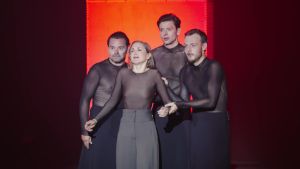10 remarkable productions
Nathan der Weise
Dramatic poem in five acts
By Gotthold Ephraim Lessing
Salzburger Festspiele
Premiere: 28 July 2023

Nathan der Weise © Salzburger Festspiele
Who has which right to take part in the debate on fundamental values? With the aid of strong formal positings and an elaborate lighting concept, Ulrich Rasche and his brilliant cast stage Lessing’s classic play “Nathan der Weise (Nathan the Wise)”.
“Nathan der Weise”, Gotthold Ephraim Lessing’s final and certainly most famous play tells the story of a failure. In Jerusalem at the time of the Third Crusade, a war-ridden society defined by separation and exclusion, a wealthy Jewish merchant is summoned by the Sultan who is in dire need to fill his war chest. In order to determine whether Nathan is ready to “voluntarily” lend the Muslim war-lord money or whether his “goods and blood” must be taken by force, the ruler poses a question: Which of the three monotheist religions is the “true” one? Nathan responds with the famous parable of the three rings, where an indecisive father chooses each of his three sons as his favourite. The point of this “fairy-tale” is that none of the three rings seems to be the real, the “true” one.
Director Ulrich Rasche and his great cast – with Valery Tscheplanowa as Nathan at its centre – perform “Nathan der Weise” on a permanently revolving stage, astutely highlighting the societal pressure that Nathan is burdened with.
Statement of the Jury
The radiance of enlightenment in Ulrich Rasche’s production of Gotthold Ephraim Lessing’s “Nathan der Weise” (Nathan the Wise) shines and blazes so brightly that it is hard to say whether it will lead humankind into a better future or simply blind them. Short, interspersed external texts by Johann Gottlieb Fichte and Voltaire suggest the latter. They reveal the deluded side of enlightenment and the fact that there were unbridled anti-Semites among its thinkers. And Lessing took a rather pessimistic kind of stance against these anti-Semites. It is exactly this pessimism that pervades Rasche’s staging and Valery Tscheplanowa’s equally sharp-thinking and moving portrayal of Nathan. Together with light artist Alon Cohen, Rasche creates boundaries made of light. These walls of light enable beautiful entrances, but they also repeatedly separate the characters, underlining Rasche’s idea of the limits of enlightenment – an idea already illustrated by Lessing’s awkward happy ending which excludes Nathan, of all people, from the family.
Tojuror Valeria Heintges’ video statement in the Berliner Festspiele Media Library (in German)
ProgrammeBooklet (pdf, 2.1 MB)
Artistic Team
Ulrich Rasche – Director and Stage Designer
Nico van Wersch – Composition
Sara Schwartz – Costume Design
Toni Jessen – Chorus Master
Alon Cohen – Lighting Design
Raimund Hornich – Sound Design
Sebastian Huber – Dramaturgy
David Moser – Associate Director
Manuel La Casta – Associate Stage Design
Antigone Akgün – Associate Dramaturgy
Cast
Valery Tscheplanowa – Nathan, a rich Jew in Jerusalem
Julia Windischbauer – Recha, his adopted daughter
Nicola Mastroberardino – Sultan Saladin
Almut Zilcher – Sittah, his sister
Mehmet Ateşçi – A young Knight Templar
Aleksandra Ćorović, Toni Jessen, Sören Kneidl, Marcel Kohler, Philipp Lehfeldt, Jürgen Lehmann, Linn Reusse, Yannik Stöbener, Alida Stricker – Daja, a Christian / A Friar / The Patriarch of Jerusalem / Chorus
Carsten Brocker – Keyboard
Katelyn King, Špela Mastnak – Drums
Carsten Hein, Thomsen Merkel – Bass, Moog
With the kind support of the Austrian Federal Ministry for European and International Affairs.





